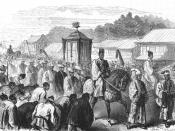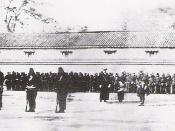The concept of Japanese punctuality and precision is a recurring theme when viewing Japan as an economy and also as a society. This theme of Japanese rigid punctuality and precision is often viewed as going hand in hand with the Japanese economic miracle, and often both are often labelled as having derived from Japan's unique culture. Japan as a nation however historically has had varying attitudes towards punctuality and efficiency in general, and these attitudes have shifted especially in the past 200 years. This change in attitudes can be linked to several key events, several reforms including their early attempts industrialisation and arguably, can remove the notion of culture being responsible for Japanese punctuality, precisions and accuracy.
The idea of punctuality, which in turn can be applied to workplace precision and accuracy due to the nature of punctuality being that of personal discipline and a regulated work structure, is viewed by the west as a linchpin of modern Japanese society.
However, Japanese society historically has not always been deemed as punctual, especially by western standards. In 1862, Ernest Satow, a British diplomat noted that the Japanese had the apparent lack of the sense of time. Indeed he noted that Japanese society had a lack of any level of punctuality, and an apparent lack of clocks displayed in general. (Satow, 1968: 229) This lack of awareness of the time can be understood as until 1873, daily life in Japan was framed by what is known by seasonal time. Governed by rare mechanical clocks, the day was divided into day and night, then into six sections called koku (Fernadez amd Fernandez 1996). At the commencement of each koku, a large gong would be sounded to inform the local communities, however for the period of around two hours between koku's, most...


